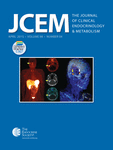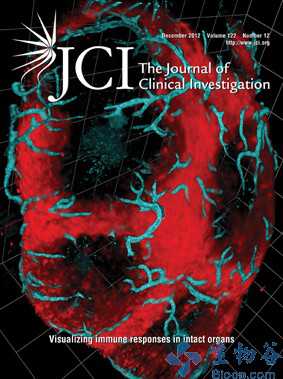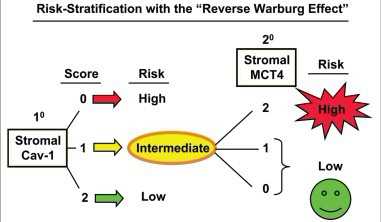JCEM:代谢缺乏灵活性是PCOS女性患者的一个特征
2013-04-30 JCEM 丁香园
代谢缺乏灵活性,也就是机体在胰岛素刺激条件下,脂肪氧化向碳水化合物氧化转变的功能受损,与胰岛素抵抗有关。这种代谢可塑性的改变可以导致器官功能障碍,并被认为是代谢综合征异常中的关键问题。在多囊卵巢综合症(PCOS)的女性是否发生这种现象仍不清楚。为了验证代谢缺乏灵活性是否是PCOS女性患者的一个特征,以及雄激素过多症是否可以导致这种现象,来自意大利维罗纳大学医学院的Paolo Moghetti教授及
代谢缺乏灵活性,也就是机体在胰岛素刺激条件下,脂肪氧化向碳水化合物氧化转变的功能受损,与胰岛素抵抗有关。这种代谢可塑性的改变可以导致器官功能障碍,并被认为是代谢综合征异常中的关键问题。在多囊卵巢综合症(PCOS)的女性是否发生这种现象仍不清楚。为了验证代谢缺乏灵活性是否是PCOS女性患者的一个特征,以及雄激素过多症是否可以导致这种现象,来自意大利维罗纳大学医学院的Paolo Moghetti教授及其团队进行了一项研究,该研究发现代谢缺乏灵活性是PCOS女性患者的一项特征。该研究结果在线发表在2013年4月17日的美国《临床内分泌代谢杂志》(The journal of clinical endocrinology & metabolism)上。
该研究在三级医疗学术中的门诊患者中进行,在89例伴有PCOS的白种女性患者进行高胰岛素正常葡萄糖钳夹试验。在基线和高胰岛素血症期间,通过间接测热法评估呼吸交换率,定量底物氧化代谢。使用液相色谱质谱分析法测量总睾酮,并通过平衡透析法测量游离睾酮。通过胰岛素刺激后的呼吸商改变评估代谢灵活性。
该研究结果表明,89例PCOS女性患者中65例(73%)伴有血清游离睾酮增加,68例(76%)有胰岛素抵抗,62例(70%)有代谢灵活性受损。高雄激素血症和正常雄激素的女性相比显示,两个亚组的年龄相仿,但在各自人体测量值和代谢特征方面不同。特别是,高雄激素血症的女性患者有更高的体重指数(32.9±1.0 vs 24.7±0.9kg/m2,P<0.001),以及在钳夹试验期间有更低的葡萄糖利用率(9.2±0.4 vs 10.9±0.7mg/kg FFM min,P=0.023)和代谢灵活性(0.09±0.06 vs 0.12±0.01,P=0.014)。在一元分析中,代谢灵活性与各自人体测量值、内分泌和代谢特征有关。在多元分析中,这个特征与基线呼吸商和胰岛素敏感性直接相关,而与胰岛素抑制下的游离睾酮和游离脂肪酸浓度呈负相关(R2=0.634,P<0.001)。
该研究发现,代谢缺乏灵活性是PCOS女性患者的一个特征。胰岛素抵抗和雄激素过多都可能导致代谢缺乏灵活性。
与代谢相关的拓展阅读:
- 抗精神病药物的代谢监测仍然重要
- JAMA:新型与AD相关的脂代谢基因
- J Cerebr Blood F Met:PET研究显示部分脑区代谢改变与强迫症症状改善相关
- JAMA:脂质代谢基因或与非裔美国人阿尔茨海默病相关
- Neurology:特发性正常颅压性脑积水脑室旁代谢降低并轴索变性 更多信息请点击:有关代谢更多资讯

Metabolic inflexibility is a feature of women with polycystic ovary syndrome
Context
Metabolic inflexibility, i.e. the impaired ability of the body to switch from fat to carbohydrate oxidation under insulin-stimulated conditions, is associated with insulin resistance. This alteration in metabolic plasticity can lead to organ dysfunction and is considered a key issue among the abnormalities of the metabolic syndrome. It is still unknown whether this phenomenon occurs in women with polycystic ovary syndrome (PCOS).
Objective
To examine whether metabolic inflexibility is a feature of PCOS women and whether hyperandrogenism may contribute to this phenomenon.
Design and Patients
Eighty-nine Caucasian women with PCOS were submitted to hyperinsulinemic euglycaemic clamp. Respiratory exchange ratios were evaluated, at baseline and during hyperinsulinemia, by indirect calorimetry, to quantify substrate oxidative metabolism. Total testosterone was measured by liquid chromatography mass spectrometry, and free testosterone by equilibrium dialysis.
Setting
Outpatients in a tertiary care academic center.
Main Outcome Measure
Metabolic flexibility, assessed by the change in respiratory quotient upon insulin stimulation.
Results
Sixty-five of the 89 PCOS women (73%) had increased serum free testosterone, 68 (76%) were insulin resistant and 62 (70%) had an impaired metabolic flexibility. Comparison of hyperandrogenemic and normoandrogenemic women showed that the two subgroups were of similar age, but differed in terms of several anthropometric and metabolic features. In particular, hyperandrogenemic women had greater BMI (32.9±1.0 vs 24.7±0.9kg/m2, p<0.001) and lower glucose utilization during the clamp (9.2±0.4 vs 10.9±0.7mg/Kg FFM min, p=0.023) and metabolic flexibility (0.09±0.06 vs 0.12±0.01, p=0.014).In univariate analysis, metabolic flexibility was associated with several anthropometric, endocrine and metabolic features. In multivariate analysis, this feature was directly associated with baseline respiratory quotient and insulin sensitivity, and inversely with free testosterone and free fatty acids concentrations under insulin suppression (R2=0.634, p<0.001).
Conclusions
Metabolic inflexibility is a feature of PCOS women. Both insulin resistance and androgen excess might contribute to this abnormality.
本网站所有内容来源注明为“梅斯医学”或“MedSci原创”的文字、图片和音视频资料,版权均属于梅斯医学所有。非经授权,任何媒体、网站或个人不得转载,授权转载时须注明来源为“梅斯医学”。其它来源的文章系转载文章,或“梅斯号”自媒体发布的文章,仅系出于传递更多信息之目的,本站仅负责审核内容合规,其内容不代表本站立场,本站不负责内容的准确性和版权。如果存在侵权、或不希望被转载的媒体或个人可与我们联系,我们将立即进行删除处理。
在此留言












#女性患者#
0
#JCEM#
58
#JCE#
71